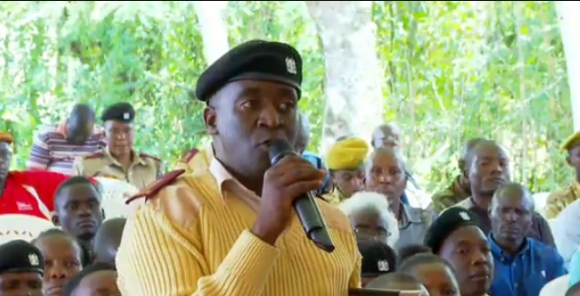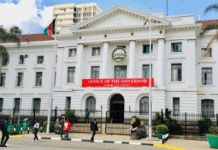A heated debate broke out in Siaya County on Wednesday, September 17, 2025, after Maliera sub-location Assistant Chief Nicholas Awuor asked Interior Cabinet Secretary Kipchumba Murkomen to consider legalising chang’aa.
Speaking during the Jukwaa la Usalama forum, Awuor argued that legalising and regulating the production of the traditional brew could yield better results than continued crackdowns.
He noted that chiefs have been enforcing chang’aa bans for decades without achieving lasting change.
“My grandfather was an assistant chief in 1968, and the same people he was arresting for brewing chang’aa are the same people I am arresting to date. That tells you the kind of resilience our people have,” Awuor said.
Awuor revealed that he and seven colleagues have been working on a policy proposal recommending the regulation of chang’aa distillation and packaging.
He said such a shift could transform the brew from an illicit product into a source of employment and economic activity.
The assistant chief proposed that the government explore new ways of handling chang’aa beyond penalties and crackdowns. He said establishing regulated distillation and packaging would not only make it safer but formalise it into a viable industry.
“We want to see if there are other ways of dealing with chang’aa apart from the penal way. I am sure if we provide resources whereby distillation is regulated, packaging is regulated, so that we can have chang’aa from Siaya being sold to other parts of the country. We will create jobs just like Keroche Industries. Chang’aa is made of unga, wheat and sugar,” he explained.
Awuor further observed that punitive measures often fail to address the underlying poverty in households where chang’aa is brewed.
“There are places you go and see poverty with your own eyes. Instead of arresting, you sometimes just leave them,” he said.
According to Awuor, the danger is not in chang’aa itself but in the lack of oversight. He compared it to imported spirits which he said are more dangerous than the traditional brew.
“Sir, chang’aa in itself is not the problem. The illicit thing in it is that it’s not regulated. But comparing chang’aa with the spirits we have that come from Uganda, the second-generation brews, those ones are the most lethal,” he said.
Awuor said legalisation could turn chang’aa into a revenue generating product and create jobs for many Kenyans.
He pointed to industries like Keroche Breweries as an example of how regulated local products can contribute to the economy.
Some leaders and residents present agreed with him but others said chang’aa should remain banned due to its link to addiction, broken families and past fatalities.



















